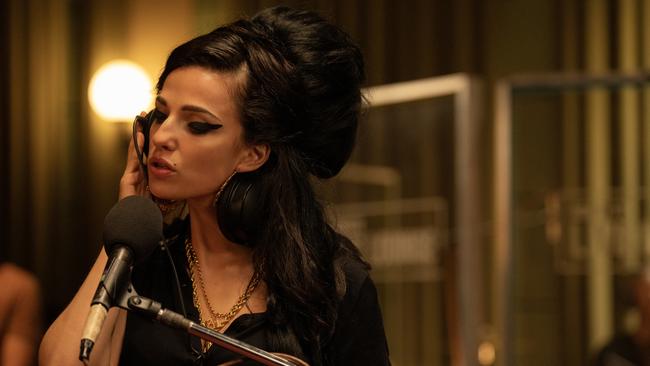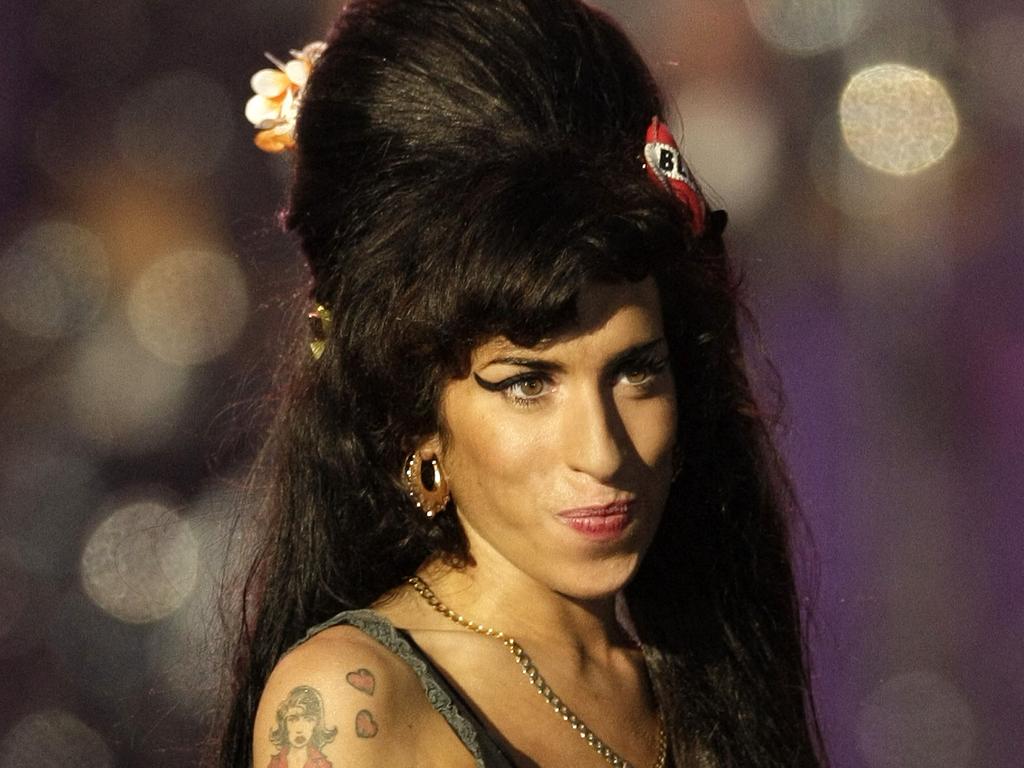Back to Black: Does this film do Amy Winehouse justice?
Can the English actor Marisa Abela, star of the biopic Back to Black, sing as well as the soulful, troubled English singer-songwriter? Of course not, but that’s not the point.

First things first. Can the English actor Marisa Abela, star of the Amy Winehouse biopic Back to Black, sing as well as the soulful, troubled English singer-songwriter?
Of course not. Winehouse, who died of alcohol poisoning in 2011, aged 27, had a once-in-a-lifetime voice. To criticise Abela because she does not, as some are doing, is like knocking Daniel Day-Lewis in Steven Spielberg’s Lincoln (2012) because he didn’t personally write the Gettysburg Address.
Abela is impressive throughout, including when she sings Winehouse’s autobiographical hits such as Back to Black, the title song of her second and final studio album.
The scene where she, in London, sings Rehab in a live video feed to the 2008 Grammy Awards is a knockout. Abela is magnetic, as Winehouse was when she did it for real.
Second things second. Does this film, made with the approval of Winehouse’s estate, soft-pedal the behaviour of people such as her father Mitch (Eddie Marsan) and husband Blake Fielder-Civil (an impressive Jack O’Connell)?
Almost certainly. For a different take on these relationships, and on Winehouse herself, watch Asif Kapadia’s Oscar-winning 2015 documentary Amy, which draws on archival material and interviews with her family and friends.
The Winehouse in this film is not as edgy and frayed as the real one. While her drinking is identified as her main problem, her drug use is understated and her bulimia is skated over.
This film is directed by British filmmaker Sam Taylor-Johnson, whose 2009 debut, Nowhere Boy, is about the childhood of John Lennon. She went on to make Fifty Shades of Grey (2015) and A Million Little Pieces (2018). The script is by Matthew Greenhalgh.
The director’s focus is on other aspects of Winehouse’s life, especially her “heart and soul” love for Blake and her desire to have a child. The scene where she and Blake meet, over a pool table in a pub, is brilliant. “Can this day get any more scintillating?’’ Blake asks.
He’ll find that it can, and he will learn that the fall from great heights is steep, and public. The main antagonists in the movie are the newspaper reporters and photographers who hound Winehouse.
Another theme is Winehouse’s approach to the music business.
“I ain’t no f..king Spice Girl,’’ she tells a record producer. The inspirations she cites are Charles Bukowski and Hunter S. Thompson, writers “who show you how ugly life can be”.
The music is arranged by Australian musicians Nick Cave and Warren Ellis. It’s a clever mix: part Abela, part real Winehouse, from a pub jukebox, for example. Cave also wrote a new song, Song for Amy, that plays over the closing credits. The performances are strong, including from Lesley Manville as Winehouse’s beloved grandmother Cynthia, a jazz singer and “my role model in everything”.
This is a middle-of-the road biopic about a musician who was anything but. It’s not great and it’s not terrible.
Friends of Winehouse have criticised it for sugar-coating her life, and the behaviour of the men closest to her. With that in mind, I do recommend watching it in tandem with Amy, which is available on ABC iView.
Back to Black (MA15+)
122 minutes
In cinemas
★★★
One smart school boy steals show
German drama The Teachers’ Lounge opens with a newbie teacher, Carla Nowak (Leonie Benesch), putting a mathematical problem to her 12-year-old students. One says the solution is easy. The teacher asks if she’s basing this on “proof or an assumption?”
This question will soon haunt the idealistic teacher, her colleagues, her students and their parents in this parable of guilt and innocence directed and co-written by German filmmaker Ilker Catak, which received a best foreign film nomination at the 2024 Oscars.
The school has had a series of thefts that started before Carla joined. The first suspect is Ali, the son of Turkish migrants. The reason? He’s found to have an “unusual amount” of money in his wallet.
His parents, called in to the school, do not pull any punches.
“Why my Ali?,’’ his mother asks in fluent German. When told why, she responds, “So what? What if a mother likes to put money in her kid’s pocket?”
This movie does explore class divisions and racial prejudice. Carla, of Polish heritage, feels like an outsider. The main theme, though, is how the solidarity of a institution such as a high school can be so quickly shattered when paranoia takes hold.
The thefts continue, including from the teachers’ lounge, where students are not permitted. Carla covertly activates her laptop camera to film whoever is in the lounge.
She thinks she identifies the thief and takes the video to the headmistress. Her colleagues accuse her of violating their right to privacy. Her students, and their parents, think she has lost the plot.
The student newspaper investigates the “scandal”. In a brilliant scene Carla is interviewed by the school journalists, some of them older than 12. After a while she resorts to “no comment”.
The tension, there from the beginning, escalates throughout. One of the 12-year-olds, Oskar (an impressive Leonard Stettnisch), is smart, perhaps dangerously so. He’s the one who solves the mathematical problem posed at the outset.
His mother works in the school’s front office. “Entire lives are being ruined because of your presumptions,’’ she tells Carla as she moves from being the accuser to the accused.
This is a bold film that uses not a child vampire, as in Abigail, in cinemas now, but real children, and the adults charged with their care, to bite hard into what happens when trust dissolves and doubt takes its place.
The Teachers’ Lounge
German language with English subtitles
98 minutes
In cinemas
★★★½
A change of fortune after bold move to combat loneliness
The melanchlic yet uplifting drama Fremont, beautifully shot in black and white, centres on a twentysomething Afghan woman who has been living in the US for eight months.
Donya (Afghan journalist-turned-actor Anaita Wali Zada) was an interpreter for the US Army during the war. She lives alone in Fremont, California, and has mixed relations with fellow Afghans in the apartment block. Some consider her a traitor who sided with the enemy.
She has insomnia and is lonely. Indeed loneliness is the undercurrent of this subtle, thought-provoking film directed and co-written by Iranian-British filmmaker Babak Jalali.
She sees a psychiatrist (American actor and comedian Gregg Turkington) who tells her his “immigrant hero” is the titular wolf-dog in Jack London’s 1906 novel White Fang. When he reads from the book it is dryly funny until it becomes deeply sad.
Donya works in a factory that makes fortune cookies for Chinese restaurants. She is promoted to the job of concocting the messages after the long-standing writer drops dead at the keyboard.
Her co-worker Joanna (Hilda Schmelling) is lonely, too, and goes on blind dates. Donya follows suit in an unusual way. She puts a message in a fortune cookie – Desperate for a Dream? – and includes her name and phone number.
Who will open that cookie and read that message?
I suspect viewers who know the cast list will hope it’s Jeremy Allen White, now as famous for his Calvin Klein underwear ads as for the outstanding television series The Bear.
They do meet, but I will reveal nothing more except the moments between them are sublime. Zada, who like her character fled the Taliban and lives in the US, is impressive in her acting debut.
Fremont starts with a sense of sadness, repressed memories and dislocation but grows into something hopeful.
It’s about how we can make connections in unexpected ways.
Fremont (PG)
90 minutes
In cinemas
★★★½




To join the conversation, please log in. Don't have an account? Register
Join the conversation, you are commenting as Logout